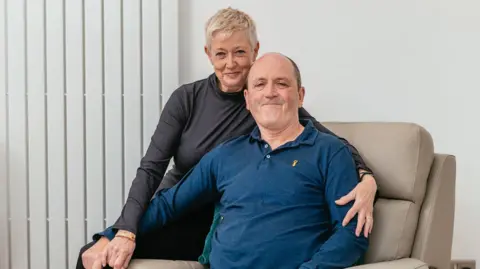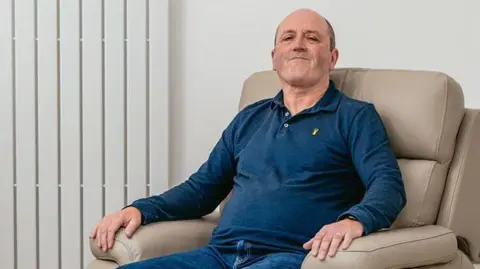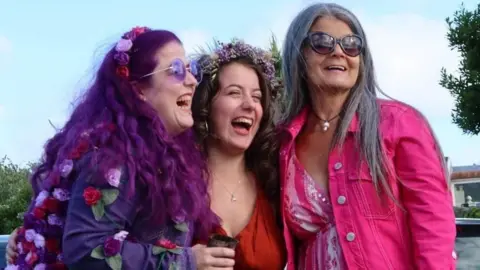Man's anxious wait for MND drug approval
 Owen Mathias/MNDA
Owen Mathias/MNDAWhen Mike Thomas first started receiving life-extending medication for his motor neurone disease, he described it as "a glimmer of hope".
Mr Thomas, 60, said his experience since being diagnosed with the degenerative condition in 2022 has been "devastating", but believes deterioration has been slowed since he started receiving tofersen.
But uncertainty remains about the medication's availability, and Mr Thomas is among a number of people with a range of health conditions who feel their fate is not in their hands as they await drug approval decisions.
The National Institute for Health and Care Excellence (NICE) - which recommends which drugs should be prescribed by the NHS - said it based its recommendations "on a review of clinical evidence and cost effectiveness".
Before his MND symptoms began in early 2020, Mr Thomas, from Bridgend, was "very fit and active", playing golf, doing parkruns and cycling.
He said he first noticed an issue when he felt soreness in his toes while playing golf, thinking he needed new shoes.
"Then some neighbours noticed I was limping while walking the dog, before I even noticed myself," he said.
He received an official diagnosis through the NHS in January 2022 and was told the average prognosis was two years to live.
Mr Thomas had to leave his job at charity Shelter Cymru and his wife Jayne, a retired nurse, became his carer, as well as looking after their 29-year-old son who has learning difficulties.
"My world has kind of shrunk... it is frustrating, the things I can't do anymore," he said, adding that he has now started using a wheelchair when outside.
In June 2023, Mr Thomas started tofersen, as part of an early access programme suitable for people with the SOD1 MND gene - he admitted he had to "battle" to gain access at a hospital in England because he was from Wales.
The medication is administered through a lumbar puncture at the hospital every four weeks, and Mr Thomas said he believes he has "not got any worse" since starting the treatment.
He added he was in a WhatsApp group with about 10 tofersen patients who all agreed about the slowing of their deterioration.
He described MND as "for all intents and purposes, a death sentence", saying that although he is unlucky to have the illness, he is "one of the lucky ones at the moment".
 Owen Mathias/MNDA
Owen Mathias/MNDATofersen is suitable for 2% of people with MND, or about 100 people across Wales and England and was previously considered by NICE as too costly for the NHS.
But, following a charity campaign, NICE announced it would reconsider its approach to the drug to look at it as part of the Highly Specialised Technologies (HST) programme, for the most rare and severe diseases.
With a final decision not yet made on the drug's availability, Mr Thomas said the risk of losing access to it made him "extremely anxious and disappointed".
He said he knew there was not a "bottomless pit of money" but it was "impossible to put a price" on NICE approval, describing the drug as a "massive step" in the treatment of MND.
How are drugs approved in the UK?
In most cases, drug approval is made up of two main steps.
Firstly, the Medicines and Healthcare products Regulatory Agency (MHRA) decide whether to approve the drug for use in the UK.
Then NICE assesses the cost effectiveness of the drug and decides whether or not to approve it for use by the NHS in England.
Wales and Northern Ireland can also follow NICE recommendations but in Scotland the decision is made by the Scottish Medicine Consortium (SMC), sometimes leading to a difference in what is available there.
 Mike Thomas
Mike ThomasSara and her brother David - not their real names - both have Friedreich's Ataxia. But, despite identical diagnoses, Sara can access medication living abroad, while David awaits a NICE decision for the same drug back home in Wales.
The degenerative condition usually affects balance, coordination, hand function, speech and heart muscles and is hereditary.
Sara, an occupational therapist, said looking back there were signs in childhood, but they were not diagnosed until their late 30s.
David used to walk on his tip-toes, while she would fall over playing sports.
David spent 30 years in the Army Reserves and first noticed a problem while on a high assault course.
"It felt like a fear of heights," he said.
He had a brain scan and genetic testing, and has since had to leave both the Army and his job as a financial advisor.
The pair joined online groups to keep track of medication progress, but said others could be left for "years in the dark".
They became aware of a drug called omaveloxolone when it was submitted for an approval decision in America, and then it made its way to Europe.
"It was the first drug in history for a disease you thought you were eventually dying of," said David.
"The buzz lines were alive with 'it's coming, it's coming'."
Sara moved to France and said healthcare there was a "much smarter way of working" than she was used to.
France agreed to an early access programme for the drug in February 2024 and Sara began receiving it in April.
Within two days her speech had improved, she stopped choking on food, her movement was more fluid and her pain reduced.
"I felt safer driving, my balance had improved, the dizziness had gone," she added.
In the UK, the drug has has been submitted for consideration by the MHRA and, if approved, a NICE decision is expected by August 2025.
"If I was holding the purse strings, I'd be careful as well," said David.
"But I wouldn't take a year and a half to be careful. I'd let the people of my nation know a lot sooner."
'Better than winning the lottery'
Claire Lewis from Hirwaun, Rhondda Cynon Taf, faced a decade-long wait to get her hands on medication for her rare bone disease.
She has X-linked hypophosphataemia (XLH), which affects bones and teeth, as do several of her relatives.
Last year, the family were left devastated after NICE rejected a drug called burosumab, described as like a "cure".
But, following extensive campaigning aiming "to show the burden" of their condition, this was reconsidered and Ms Lewis and her family are now celebrating a U-turn.
 Claire Lewis
Claire Lewis"It's better than winning the lottery," said Ms Lewis, 60.
She is now looking forward to the future, and being able to keep up with her first grandchild, who was born this year.
Offering advice to others awaiting drug approval, she said: "Keep on it. Engage with medical professionals and research studies.
"Be your own advocate, because too often you will be fobbed off."
NICE said it is asked to look at particular medicines and other treatments when availability varies across the country.
It bases its recommendations on a review of clinical evidence - which looks at how it works and how safe it is - as well cost effectiveness, analysing whether it represents value for money.
